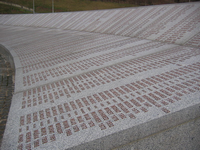Fourteen years after the massacre of 8,000 Muslims at Srebrenica in Bosnia, the perpetrator of the largest atrocity in Europe since World War II, indicted war criminal Gen. Ratko Mladic, still roams free. Worse still, if the recent anniversary of the massacre -- which garnered little notice in European countries and the United States -- as well as recent diplomatic signals are any indication, Europe and the U.S. seem ready to effectively turn the page on his arrest.
This is surprising, because while the instruments of international accountability are slow and cumbersome, they are beginning to demonstrate the capacity to deliver justice once indictees are delivered into custody. Liberia's former President Charles Taylor is on trial for war crimes committed in Sierra Leone; verdicts have been rendered in Rwanda; Radovan Karadzic, the war-time leader of Bosnia's Republika Srpska, is on trial in The Hague; Yugoslavia's former President Slobodan Milosevic died while on trial there; and Sudan's President Omar al-Bashir has been indicted by the International Criminal Court.
Yet in the case of Mladic, where Western resolve is being tested, the United States and Europe are simply not doing all they can to ensure that international justice gets a chance to fill its internationally mandated task.

